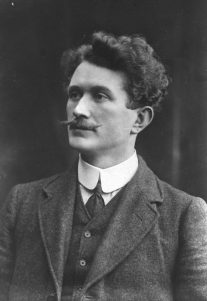
Post by Olive Morrin, Special Collections & Archives
The hundredth anniversary of Thomas Ashe’s death occurs on the 25th September 2017. He was an Irish volunteer who participated in the Easter Rising and actually lead the only successful action taken outside of Dublin. He commanded the 5th battalion of the Irish Volunteers who won a significant victory in Ashbourne, Co. Meath (which is not connected with his name). Special Collections holds a copy of The death of Thomas Ashe: full report of the inquest.
Thomas Ashe was born in the townland of Kinard near Dingle, Co. Kerry where his father Gregory was a farmer. He entered De La Salle Training College, Co. Waterford in 1905 and in 1908 he became principal of Corduff National School in Lusk, Co. Dublin. Thomas Ashe made a considerable impact in his new post and community surrounding Lusk. He used his many talents for the betterment of his school and community and was a respected teacher, excellent footballer, hurler and musician with a fine singing voice. He was also an actor, writer and produced many plays in the public library at Lusk. As he came from a Gaeltacht area it was natural he should promote the Irish language and he founded branches of the Gaelic League in Skerries and other neighbouring villages and organised many céilí dances. He founded the award winning Lusk Black Raven Pipe Band and in 1913 he joined the Irish Volunteers.
Recognised as a natural leader he was given command of the Irish Volunteers’ 5th Battalion in 1916. He was a skilled organiser and when the Rising broke out he moved his detachment along in stages to Ashbourne. Against the odds and significantly outnumbered his battalion managed to defeat the RIC troops and captured four police barracks and a large amount of guns and ammunition. This success was mainly due to his adoption of guerrilla tactics which included striking at enemy targets and withdrawing while capturing arms and was in sharp contrast to the style of fighting in Dublin. This approach probably influenced the Volunteers’ successful strategy in later engagements during the War of Independence
When Ashe received news of the surrender he complied with the order and was arrested, court martialled and sentenced to death. His sentence was later commuted to life imprisonment. While in prison he composed his well know poem “Let me carry your cross for Ireland, Lord”. He was released in June 1917 as part of the general amnesty. Upon his release he was elected President of the Irish Republican Brotherhood (IRB) in place of the executed Pádraig Pearse. He travelled throughout the country making speeches which resulted in him being rearrested in July for incitement and sedition. While in Mountjoy Jail along with other fellow prisoners including Austin Stack he demanded Prisoner of War status. When this was refused he and six other went on hunger strike. As punishment the authorities took away their beds, bedding and boots. It was later decided to force feed the prisoners and along with other prisoners Ashe was put in a straitjacket and force-fed. The procedure was administered incorrectly by a trainee doctor and in an already weakened state Ashe collapsed on the third day. It was later discovered that the feeding tube had entered and pierced his lung and he died two days later in the Mater Hospital of heart and lung failure. At the inquest following his death the jury condemned the staff at the prison for the “inhuman and dangerous operation performed on the prisoner, and other acts of unfeeling and barbaric conduct”. There can be no doubt that Ashe must have suffered greatly during these procedures which caused his death at the age of 33.
Thomas Ashe’s funeral on the 30th September further galvanised public support for the IRB and was attended by 30,000 people. Michael Collins now propelled into the republican leadership gave a short sharp oration in English and Irish. After the volley of shots he stepped forward and said “Nothing additional remains to be said. That volley which we have just heard is the only speech which is proper to make above the grave of a dead Fenian”. As with Pearse’s oration at the funeral of O’Donovan Rossa these words were a forewarning of the coming War of Independence.
Thomas Ashe’s unfortunate death further robbed Ireland of a brave, talented and charismatic leader.
Both Sean O’Casey and local poet and nationalist Teresa Brayton wrote poems about Thomas Ashe after his death, below is the more subdued last verse of Teresa Brayton’s poem:
We buried young Thomas Ashe among the best of our brave,
He was a soldier of Erin, he lies in a soldier’s grave;
His name and his deeds we keep in the scroll of our sacred things
And the cause that he died for yet will sweep o’er the dust of forgotton kings.
References:
Wikipedia – https://en.wikipedia.org/wiki/Thomas_Ashe
Thomas Ashe by Sean O’Casey – PA 1206/16 (Russell Library)
The death of Thomas Ashe: full report of the inquest: published by J.M. Butler, 1917. SP 1537
Hail to the flag: through the turbulent years: poems by Teresa Brayton. Compiled by Bernadette Gilligan. Published by the Teresa Brayton Heritage Group, 2016.
Photo of Thomas Ashe from Google Images: http://bit.ly/2mPyViu